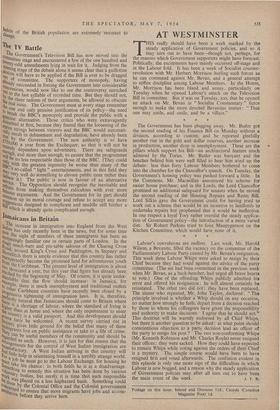WESTMINSTER
The Government has been plugging away. Mr. Butler got the second reading of his Finance Bill on Monday without a division, according to custom, and he reported gleefully another rise in the gold and dollar reserves, another increase in production, another drop in unemployment. These are the • pillars which support his Bill—an architectural feature much admired by the Tories. Mr. Butler was buoyant and this benches behind him were well filled to hear him wind up the debate: less than forty Labour Members bothered to come into the chamber for the Chancellor's speech. On Tuesday, the Government's housing policy was pushed forward a little. In the Commons, Mr. Macmillan announced his scheme for easier house purchase: and in the Lords, the Lord Chancellor promised an additional safeguard for tenants when he moved the second reading of the Housing Repairs and Rents Bill. Lord Silkin gave the Government credit for having tried to work out a scheme that would be an incentive to landlords to undertake repairs but prophesied that it would be ineffective. In one respect a loyal Tory rather overdid the steady applica- tion of Government policy—the introduction of a more varied diet. Sir Robert Perkins tried to foist Maupygernon on the Kitchen Committee, which would have none of it, * * * Labour's convulsions are endless. Last week, Mr. Harold Wilson, a Bevanite, filled the vacancy on the committee of tho Parliamentary Labour Party caused by Mr. Bevan's resignation. This week three Labour Whips were asked to resign by their Chief because they had voted against the advice of the party committee. (The sin had been committed in the previous week when Mr. Bevan, as a back-bencher, had urged all brave hearts to vote.) One of the offending Whips publicly admitted his error and offered his resignation: he will almost certainly be reinstated. The other two did not: they have been replaced. The sinner who repented, Mr. John Taylor, declared : " Thio principle involved is whether a Whip should on any occasion, no matter how strongly he feels, depart from a decision reached by those to whom his colleagues have given the responsibility and authority to make decisions. I agree that he should not.' This doctrine will be warmly endorsed by all Chief Whips, but there is another question to be asked : at what point should conscientious objection to a party decision lead an officer of the party to resign his post The two non-conforming Whips (Mr. Kenneth Robinson and Mr. Charles Royle) never resigned their offices: they were sacked. How they could have expected to remain Whips while voting against the orders of their Chief is a mystery. The simple course would have been to have resigned first and voted afterwards. The confusion evident in this episode is only one more sign of the difficulties in which Labour is now bogged, and a reason why the steady application of Government policies may after all turn out to have been the main event of the week. J. F. B.










































 Previous page
Previous page